- Pronouns
- he / him / his

Written by HEM
Editor-in-Chief
Instead of polling on the upcoming Presidential elections, or the final days of the Aexnidaral Seymour Administration, ENN took a pause to ask some questions about Europeia’s culture, politics, and key institutions.
Our recent survey attempted to cover a great deal of ground while also being thorough. There are some questions that should be asked that were not included. There were other questions that tried to distill complex, nuanced issues into two or three options. This poll was not meant to produce definitive policy prescriptions, but rather get a broad-strokes view of how Europeia stands today — in the eyes of her citizens.
Before anything else, we turn to the Civil Service and the Citizens’ Assembly. Both have their underpinnings in the boom of 2009 (where regional activity surged to historic levels) and both are often cited as the key integration institutions in the region. The Civil Service — though that name is mostly a relic of an old bureaucracy swept away long ago — serves the region by getting new citizens assigned to various Assistant Minister positions. The Citizens’ Assembly serves as a citizens’ first taste of the region’s legislative system, giving citizens experience in law-writing and regional debate. Both bodies have been credited for Europeia’s longstanding success, and both have undergone heavy changes that “eliminate hoops” for new citizens, but may not have improved outcomes for participants.
For the purposes of this survey, “new members” is being defined as citizens who joined in 2015, 2016, and 2017 (n=17). “Old members” are being defined as citizens who joined in 2007-2014 (n=18). For the purposes of future clarity, in this report I refer to myself in the third person.
The Civil Service
The Assistant Minister program is not one that has undergone much scrutiny in the last months. Any remnants of the ancient centralized Civil Service program have been swept away years ago, replaced by a decentralized system that strives to be as liquid as possible.
“It's pretty simple,” Civil Service Director Rand told ENN. “Somebody seeking to get involved in the Executive goes to the CSO, they take our single, simple application form and post it, marking which Ministries they'd like to join. Then, I go through the application and poke the Cabinet members so they can invite the applicant to their Ministry.”
Rand describes his role as “HR-like” and he has no contact with Assistant Ministers once they are approved for service. “What happens in the Ministries is controlled by the Ministers,” he told us.
Most Assistant Ministers tend to hold posts in multiple, or even “countless” different departments at once. 81% of survey respondents who indicated they were serving as an AM were juggling 3 or more various portfolios at the same time.
Some would make the argument that broad, not deep, Assistant Minister portfolios allow citizens to get a taste of every Ministry without fully committing; helping them figure out their next steps in Europeia. But there is considerable evidence that the Civil Service has not been producing demonstrably good outcomes for Assistant Ministers.
59.2% of respondents indicated that “few” or “none” of their portfolios have helped them develop the skills necessary to be a Minister. Only 14.8% feel “all or most” of their Assistant Minister positions have done so.
When looking only at new members, those numbers are even worse, with 68.8% saying that only a “few” or “none” of their AM jobs have made them prepared them to be a Minister. That number increases to 75% when looking exclusively at members who joined in 2016 and 2017.
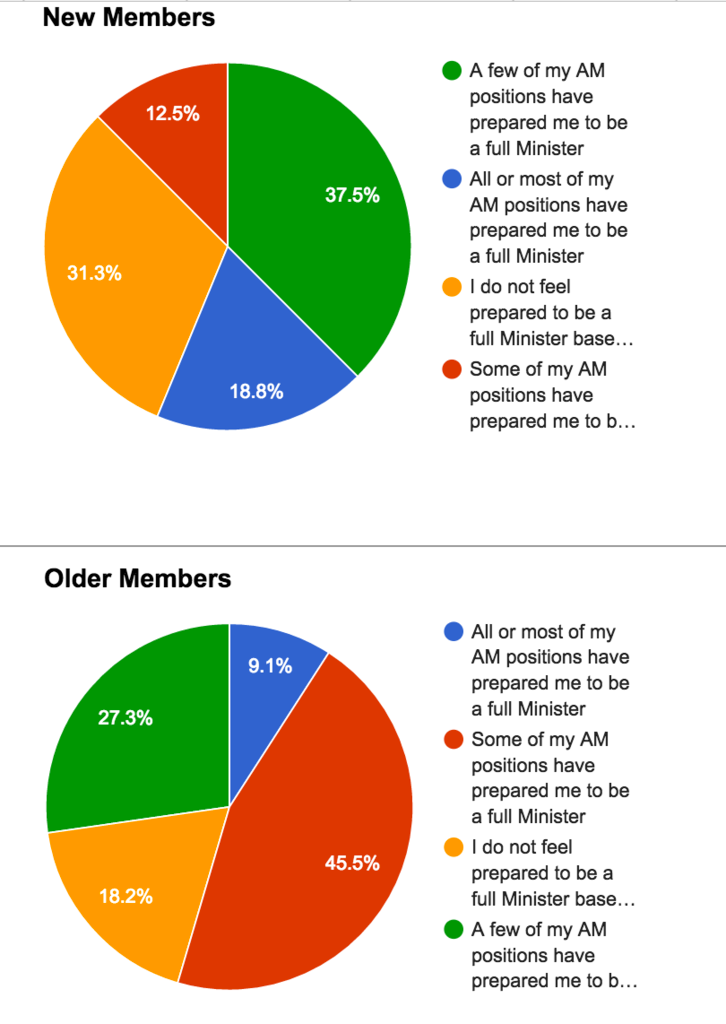
There are no definitive outcome differences for AMs who are in certain Ministries. AMs in Communications and Interior seem to fare slightly better than AMs in Justice or World Assembly, but assigning quantitative labels to qualitative descriptors of preparedness can be difficult, if not downright misleading.
While wholesale reform in the Civil Service is unlikely after Presidents Trinnien and HEM failed to establish an internship program last summer, present outcomes in the Assistant Minister program are clearly less than ideal.
The oversaturation of individuals serving in so many Ministries concurrently may also be making it difficult for Ministers to get tasks accomplished. According to ENN’s survey, over 70% of Assistant Ministers hold posts in Foreign Affairs, Communications, Culture, and Interior. Over 50% hold an Assistant Minister position in Radio.
Radio Minister Cat, talked at length to ENN about how she perceived the Assistant Ministers system, saying that it was true that some AMs don't do a whole lot:
"We have lurkers who are categorized as members who do not contribute to a ministry. These members typically constantly view topics and not comment, or apply to a ministry and eventually lose citizenship. Which in itself can be an issue, especially in ministries that could use the extra help. However, lurkers can also be beneficial. For example, if you're a sitting senator and keep up with the various ongoing topics and issues in a ministry, you can question the nominee accordingly. Or if you're in a lurker in FA and need to vote on repealing a treaty, it really helps to have that knowledge ready." Cat went on to emphasize that there were different types of Assistant Ministers who behaved differently.
An unnamed Assistant Minister offered ENN a more blunt take, confessing that he just “collected” the various positions to get information: “Because otherwise you have no idea what is happening. It’s the only way to see what’s happening because people don’t communicate for shit.”
When asked for comment on the low grades for the Civil Service, President Aexnidaral Seymour told ENN, "Yeah, it's understandable, it's been a trend that's been an undercurrent for a few terms," and told us to look to Ministers Cat or Writinglegend for a good model of how to empower AMs.
No empirical evidence in this survey supports the idea that either the Radio Ministry or Culture Ministry has significantly better outcomes for AMs.
The Citizens' Assembly
The Citizens’ Assembly is a successor organization to the third iteration of the City Council, a lay-legislature that was meant to provide a voice for new citizens and serve as a legislative testing grounds. Over time, the body faced new reforms — being rechristened the Citizens’ Assembly in 2013 — and, more recently, expanding membership to all citizens as a right. Indeed, today all privileges given to “the people” are exercised by the Citizens’ Assembly.
Yet, shockingly, 45.7% of citizens “rarely” participate in Citizens’ Assembly discussions. This is compared to 22.9% who “very frequently” or “frequently” comment. When discussions don’t involve commentary on Senate business, 54.3% only “rarely” comment, and only 20% “very frequently” or “frequently” comment. New members are just as unlikely to participate in Citizens' Assembly discussions than older members.
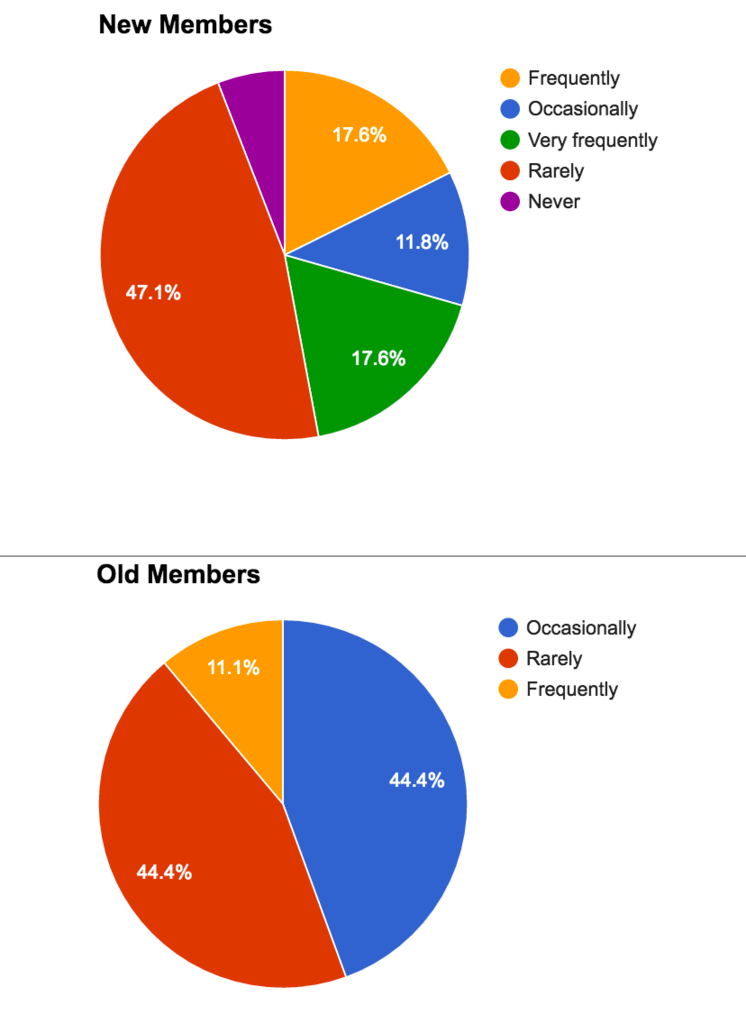
Furthermore, the educational outcomes in the Citizens’ Assembly are dubious, at best. 50% of respondents who indicated that they have not sought a Senate seat say the primary reason they haven’t is because they don’t think they would win.
Despite large swaths of people admitting they only participate infrequently, upon first pass, there is very little political will to move the Citizens’ Assembly away from the status quo.
64.7% of respondents suggest that the current model of the Citizens’ Assembly being a public forum for discussion that serves as “the people” best represents their view of what the institution should be. This contrasts with the 14.7% who feel the body should be encoded into the Constitution and given separate powers, and 20.6% who believe the body should be a political institution separate from “the people” but not be codified into the Constitution.
It should, however, be widely reassuring that a landslide 94.3% could identify that they were, by right of citizenship, a member of the Citizens’ Assembly.
Political Issues
Turning away from the Citizens’ Assembly and Civil Service, we now explore some other issues in Europeia.
When presented with only two options, a solid 58.8% of respondents believe that the EBC should be free to criticize the government, versus 41.2% who felt that by right of being a government agency it should abstain from criticism.
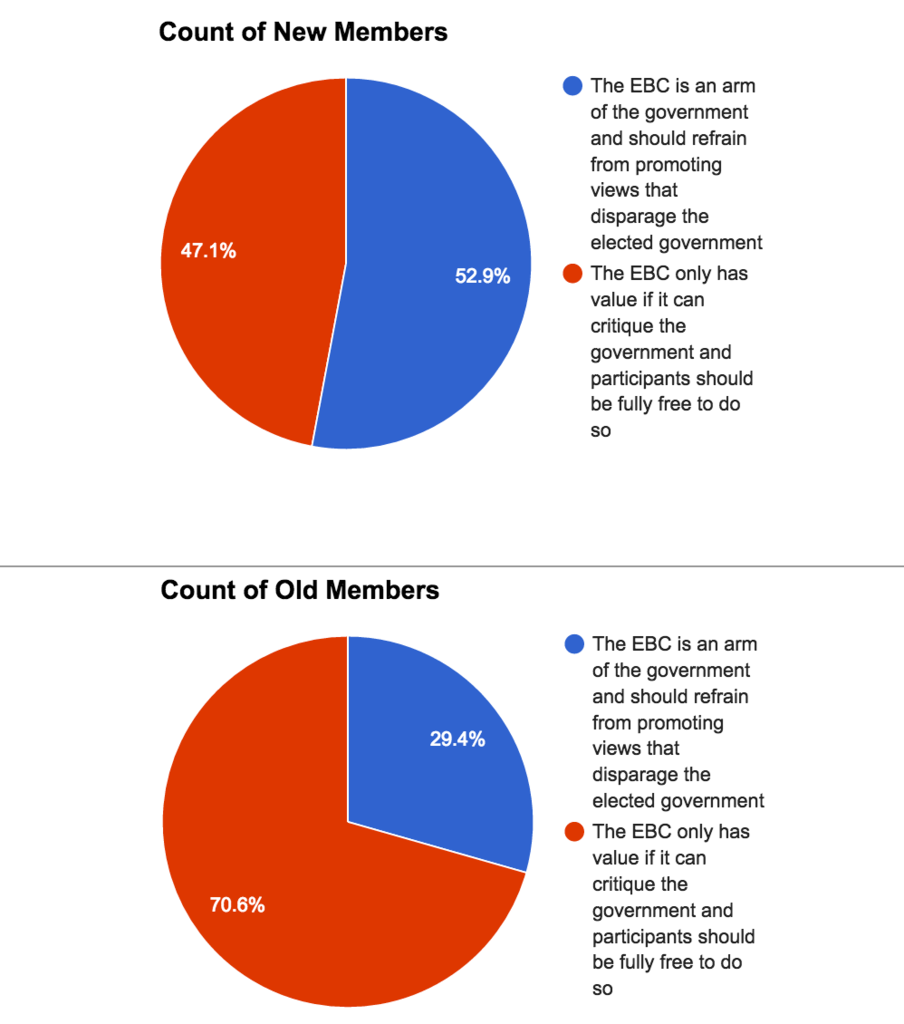
A topic of popular public discourse was Senator Isaris’ very public berating of Senate Aide Constie, who brusquely challenged an announcement by President Aexnidaral Seymour. 57.1% felt the scolding was wrong, while another 34.3% said it shouldn’t have been in public. Only 8.6% of respondents supported the public nature of the reprimand, and Senator Isaris has since clarified his expectations and fired Constie for an unrelated matter.
There have been numerous discussions in recent months of an old/new divide in Europeia, and when asked, most Europeians did believe that older members had a little bit easier of a ride. 48.6% believe that old members don’t have to work as hard as newer members for positions, while 22.9% believe they don’t really work for positions at all. Another 28.6% believed that old members worked just as hard as newer ones for their laurels.
Perhaps in the most unsurprising moment of this poll, there was a generational divide in this question: 44.4% of respondents from 2007-2014 believe that older members work “just as hard” for positions, while only 11.8% of members from 2015-2017 said the same.
When looking broad strokes at politics, the clear majority, 60%, believe that Europeian politics can be “harsh” but is “typically fair.” 20% believe it is too soft, while 20% believe it is too personal and “extremely harsh.” In the biggest surprise of the poll, newer members actually tended to believe politics were "too soft" more often than older members.
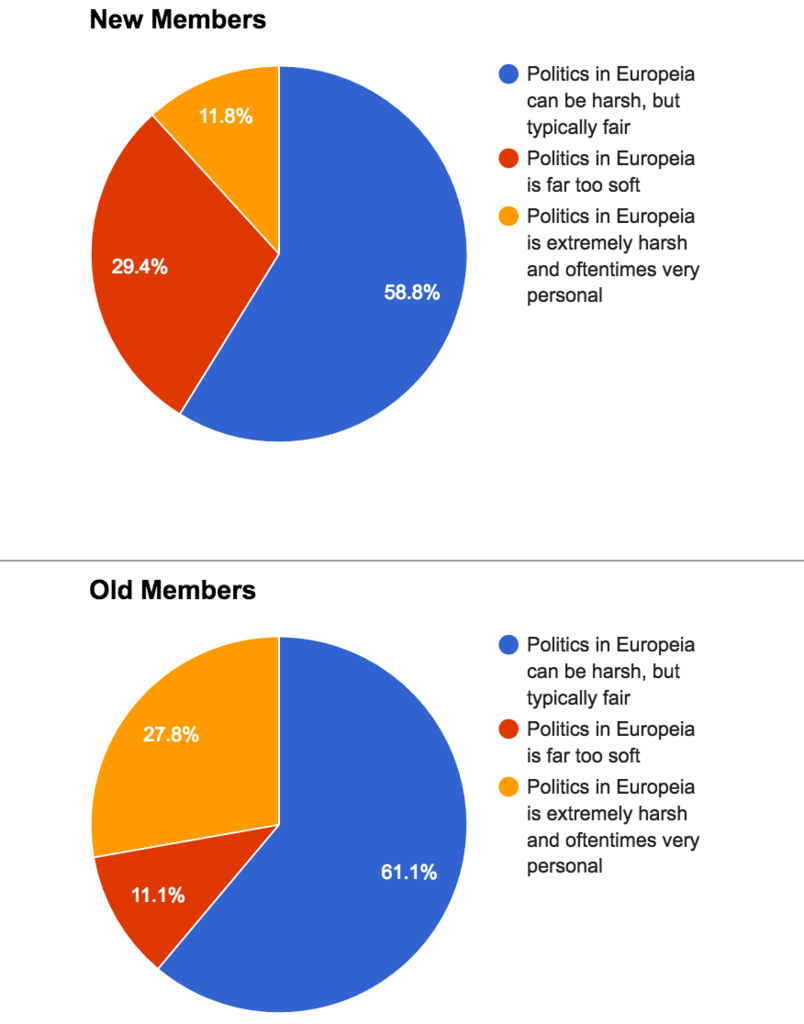
There is also a gigantic divide, however, when looking at respondents perception of the region’s direction over the past term. A defiant 61.1% of older members feel this term has taken the region down the wrong track, while only 11.8% of new members agree.
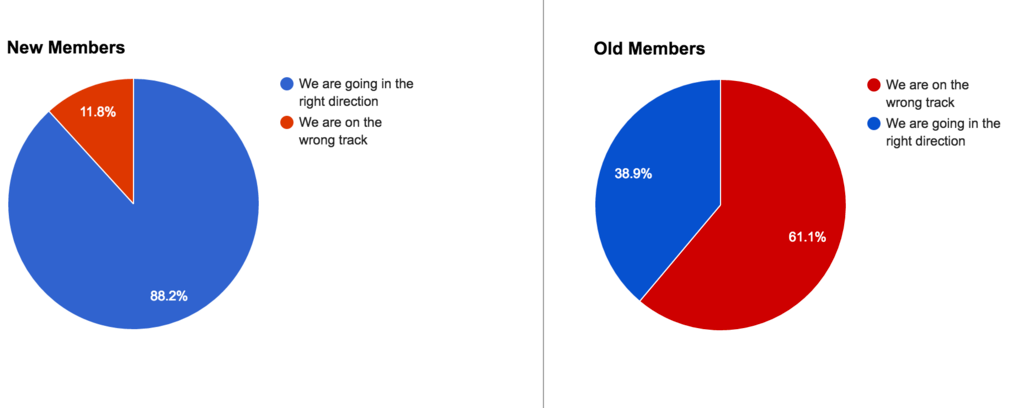
In total, a confident majority of 62.9% see the region on the right path after this Presidential administration.
Cultural & Social Issues
Why do we do all this?
Europeia has a lot of different answers to that question. 54.3% of respondents say it’s the political game that keeps them invested. 28.6% say it’s the community and friendship, while 17.1% say it’s another reason.
Meanwhile, some of the most popular activities are debates over Europeian politics (80%), working in the government (82.9%), socializing in EuroChat (65.7%), talking to Euro friends about non-NS stuff (65.7%), and participating in EBC Radio (57.1%).
Two of the universally least popular activities are roleplay (8.6%), and spam games (17.1%).
While there has been talk of Europeia being less political in recent years, an overwhelming 62.9% say that it is the elimination of popular elections that would most likely lead them to leaving the region. The elimination of the Discord server is a distant second at 22.9%.
However, in a moment of haunting vindication for those who feel the priorities of new members have shifted from politicking to socializing, there is a stiff generational gap here.
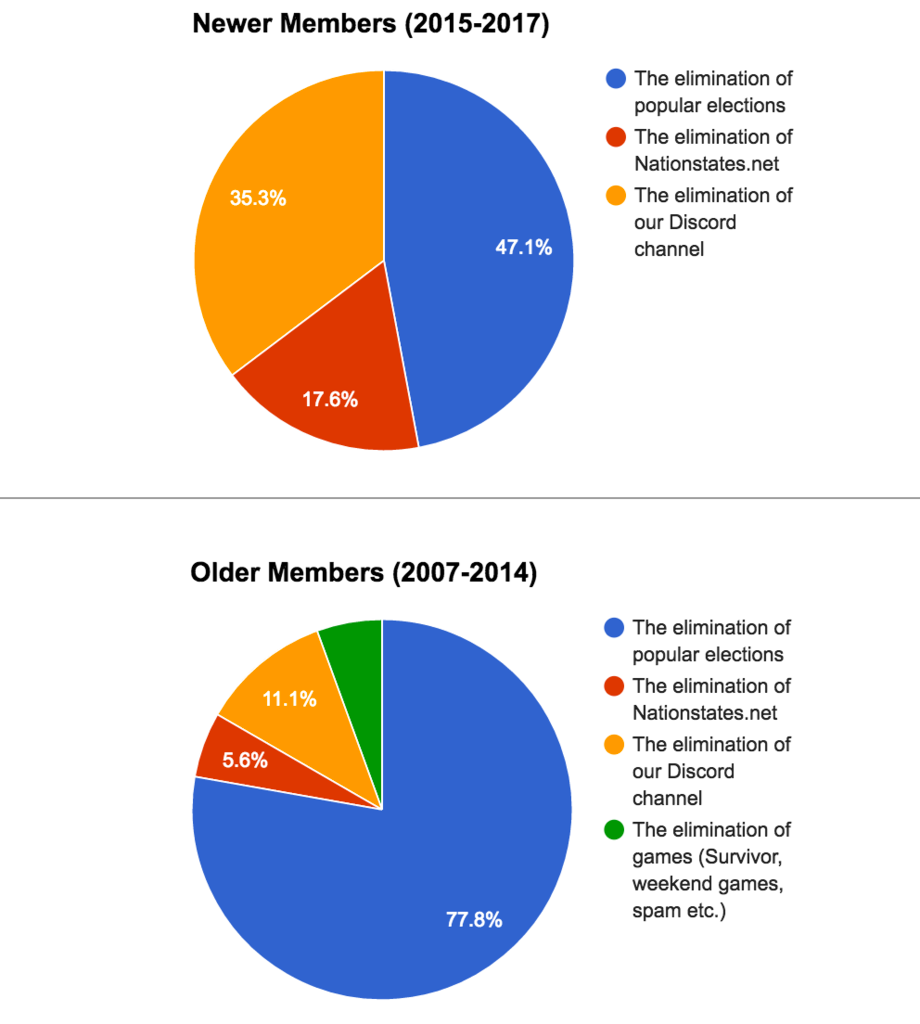
Members who joined in 2015-2017 are deeply divided on whether the elimination of the Discord server, or popular elections, would be more likely to lead to them leaving the region. However, this question might not tell the whole story.
The question does not ask members how much the elimination of each thing would bother them, and it is very possible that the great majority of new members value popular elections nearly as much as the Discord channel. It is also possible that there is a “generational” effect to the importance of mass-communication, with newer members always valuing it more than older members — rather than some massive regional culture shift that has new members caring less about government.
Summation
The biggest limitation of the data in this poll is that on most of the questions, there is no previous data to compare to.
Is the newer generation’s affinity for Discord evidence of a massive culture shift that has newbies caring more about socializing than building a region, or is it merely a manifestation of a typical trend that younger members have more time for socializing than older members who are semi-retired? It’s impossible to know.
The same problem presents itself when analyzing data from the Citizens’ Assembly and Civil Service. The outcomes of both institutions seem rather poor, but is this a new phenomenon or would members polled in years past responded similarly? The bias of this author might lead the reader to believe that the more centralized, bureaucratic Civil Service of the past; or the more independent Citizens’ Assembly of the past, produced measurably better outcomes for participants. While that may be a valid opinion, it is crucial to highlight that there is no data to support that. Reformations of the past five years may have made both institutions a hundred times worse, they may have also made them a hundred times better, or they may have had no effect at all — we simply do not know.
Without a clear trail of data, this survey cannot in any good conscience offer policy prescriptions or ascribe causality. We do feel confident, however, making a few broad statements about Europeia as she currently stands:
(1) New members are just as likely as older members to enjoy “debates over Europeian politics” and are only a little less likely to enjoy “working in government.” Also, in perhaps the biggest coup of the survey, newer members are three times as likely as older members to say that politics are “too soft” in the region. Despite this, they periodically select against political activities and for social or cultural activities.
(2) New members have far more representation in the Civil Service than older members, yet are disproportionally impacted by the shortcomings of our Assistant Minister program. New members are 61% more likely than older members to say that “none” or only a “few” of their AM assignments have left them prepared to be a full Minister.
(3) While the Citizens’ Assembly is arranged to be a training facility for our youngest members, in practice, new members are just as likely as old members to only contribute “rarely”. Newer members are significantly more likely to participate in discussions regarding original legislation, however; they are also infinitely more likely to say they fear running for Senate because they feel unqualified, rather than just not enjoying legislating (not a single old member said this, while 75% of new members cited that as their reason for not running).
(4) Newer members are more optimistic about the direction of the region — both over the course of the term and last year. Members who have been here less than a year, however, do not appear to be more optimistic than the greater sum who joined in the past 2 and a half years.
There is a very apparent paradox where new members say they want to be involved in politics and government, but when given either/or choices, they tend to select for more community and social activities. Simultaneously, outcomes for integration institutions like the Civil Service and Citizens’ Assembly are poor — especially for new members. Are new members just lying about their priorities, or is there something more going on here?
Typically, discussions about modern political culture in Europeia evolve in a very predictable way, with older members chiding newer members for not being “tough enough” and bemoaning their lack of cajones. However, the underlining question offered by these data is thus: are new members letting us down, or are we letting them down?
Conclusion
In 2011, when the first movements toward a stronger law and judicial system were made, many people compared the ensuing debates to the process of automation and globalization in the real world.
“Protectionists” led by HEM and Anumia, believed that by making the law system better, we were making it harder and harder for new members to compete and participate in Europeia:
“With every stride we take in this direction, we are cutting off new members, new ideas, and new potential. We are creating a barrier between the "in" and the "out"; between the "smart" and the "dumb"; between the "political" and the "not". This barrier is one of the singular most dangerous things I have witnessed during my tenure as founder of Europeia.
For if new members must pass a poli-science final to understand our laws, than how can we reasonably expect growth?” (A Region of Imperfection, March 2011)
Yet “free traders” like Oliver Grey, Hyanygo, and Swakistek believed that the only way to move was forward. There was no honor in shrinking from perfection, and not embracing change. Like the luddites who tried to destroy machinery to prevent the advent of industrialization, HEM sought to stop laws from getting better, and expectations for such laws from getting higher.
The free traders won the day, as they should. However, just like we see in real life today, people appear to be getting left behind. In real life, increasing automation requires increasing education and technical skills for their citizens. Without that key training, citizens won’t be able to find jobs and they’ll vote to leave the European Union / elect Donald Trump / stick to just social activities.
In 2009, the education facilities of the Citizens’ Assembly and the Civil Service was enough education. In the mid-1900s, basic literacy was enough education. Today it’s not. Today it takes more. Today we need to do better.
##
Selected Comments:
I fall in so many cracks here, my preferred answer to running for senate is that I am not good enough for the Senate, whether I won or not is irrelevant I would not be a good senator. Also Some older members think they deserve positions without any need to prove themselves, some lean heavily on their record, and some work amazingly hard, the same applies to newer members, some think they deserve a position by virtue of existing and others show what they can do with fervour.
I think the Office of the Supreme Chancellor is not needed, we could easily just make an electoral commission.
The EBC is a mouthpiece for the Administration. That said, I think that the EBC should be able to disagree with the current Administration, but not seek to defame it. As EBC articles are visible to people outside our region, the reins must be tighter with regard to our Foreign Affairs agenda, so as to not give off the appearance of internal dissent (if we had a place to put EBC articles that only citizens could read, on the other hand...).
Isaris should have scolded his aide for what he said. It's not that he questioned the President, it was the manner in which he did it, and the question that was asked. Constie made himself look like a fool, which doesn't reflect well on Isaris. Constie's question comes off as harsh (although he may not have meant it to, and an apology would be warranted if that was the case), which also doesn't reflect well on Isaris. For both of these reasons, Isaris should have chastised Constie, but it most definitely should have been done privately.
I would rather simply have the EBC abolished, perhaps even deleted, by a official who had the admin powers to do so.
I want to elaborate on a few of my answers and the survey. (Comments on everything instead of one small, last comment section might have been better)
1. I don't understand why the AM questions had to be so detailed in this context. Maybe I'll be surprised, but I don't think it adds anything
2. Isn't every citizen a member of the CA?
3. For the two most important features, I missed something like "skill". Experience can be had without being skilled at the office you want to pursue.
4. In regards to the EBC question, I'd have liked more of a choice. I understand you stressed that one should take what best characterises the own view, but I find both options wrong. Criticism should be allowed, but in the context of a balanced debate, and there are programs where I believe the President would be correct to rewrite bits, or alternatively not to share them abroad.
5. The Isaris question is awfully specific too. I also don't think the wording is very good. Questioning the President should generally be allowed, but very generally there can also be situations where such a questioning can be damaging to your reputation or not appropriate. That's why I made my choice in the survey less in regards to the question, but more with the actual situation in mind. This however portrays Isaris in a worse light than is fair, in my view.
6. I said politics are too soft, but at the same time I believe they're too personal. Intelligent and critical debate is a bit rate, because it often diverges to a personal level instead, or even starts that way. Real discussions on subjects and dealing with facts come too short and are dealt with too softly, in my view.
7. Past-term-question: Which past term? Senate? The President's term? I think Europeia is generally going into the right direction, and that mistakes only correct the direction we're taking even more, so that wouldn't have changed my answer, but it might have still been good to specify.
Overall interesting and different survey from the usual ones.
The clique culture is poisoning our region and will soon lead to a mass exodus or worse a complete fracturing of the region. People have no sense of working together for the good of the region and are focused only on personal political gains and destroying those they see as opponents and those that critic them. Most of us are insistent we aren't doing that, but you are all either delusional or lying. These behaviors need to be taboo. Additionally assertions about members needing to leave politics because they already served in a lot of position need to stop, that makes it about gaining positions rather than building the region, and if you are here only to gain positions or power I have a short message for you: "Get the fuck out."
EDIT: This analysis originally stated that there wasn't much of a generational divide when looking at the harshness of regional politics. That is actually inaccurate, there is a divide — just not the one we expected.